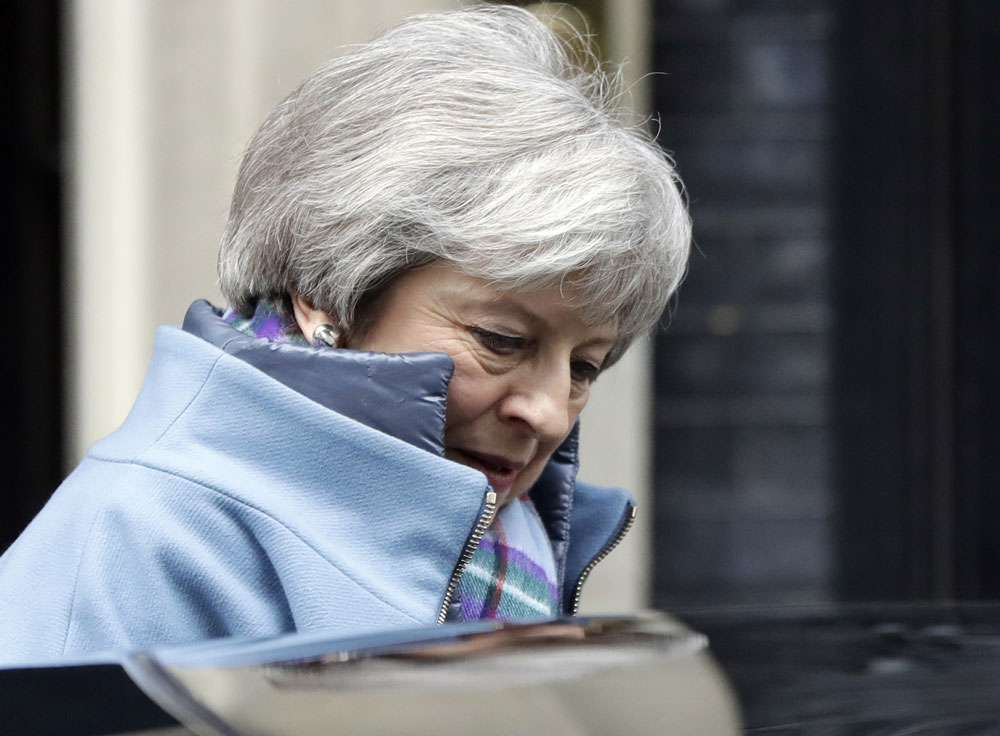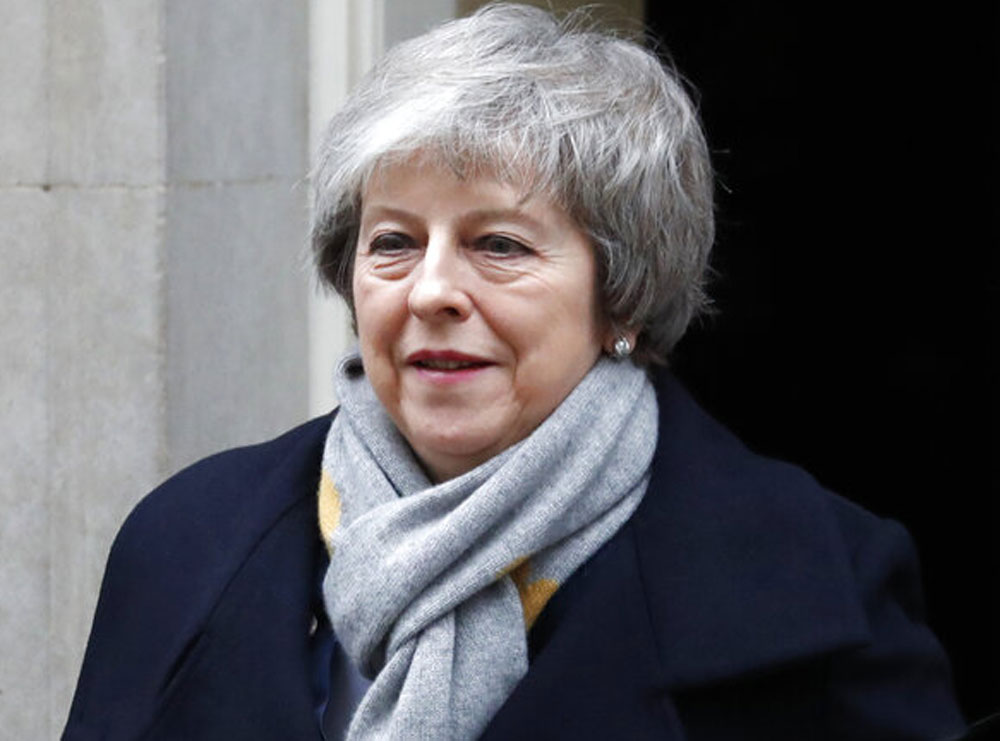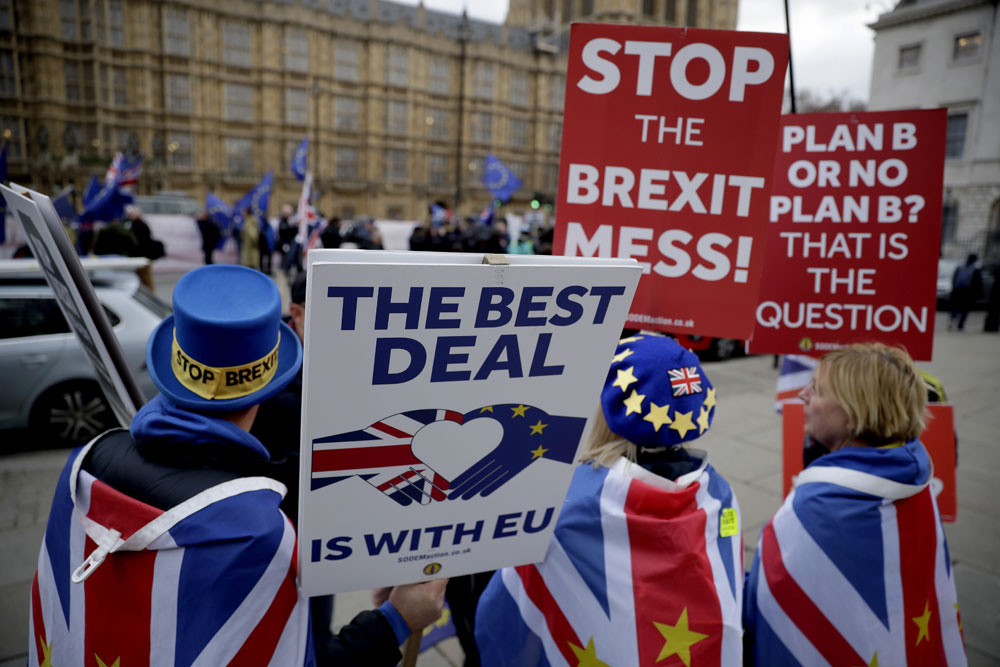British Prime Minister Theresa May on Tuesday sought to salvage a Brexit deal but headed toward a clash with the European Union by promising to overhaul the divorce deal she spent a year and a half negotiating with the bloc.
Trying to break the Brexit deadlock, May urged lawmakers to send the EU an 'emphatic message' that they would not accept an Irish border guarantee in the withdrawal deal — a provision May and the EU both approved late last year.
The Brexit process has grown increasingly surreal since Parliament rejected May's divorce deal two weeks ago, leaving Britain lurching toward a cliff-edge 'no-deal' departure from the bloc on March 29. The House of Commons was debating and voting Tuesday on competing proposals for next steps that have been submitted by both pro-Brexit and pro-EU legislators.
EU leaders have ruled out any renegotiation of the Brexit deal, but May urged Parliament to back a call for the border measure to be replaced by unspecified 'alternative arrangements.'
'Today we have the chance to show the European Union what it will take to get a deal through this House of Commons; what it will take to move beyond the confusion and division and uncertainty that hangs over us,' May told lawmakers.
May, who planned to call EU leaders, insisted her agreement could still win Parliament's backing if it was tweaked to alleviate concerns about the Irish border measure, known as the backstop. The backstop would keep the UK in a customs union with the EU in order to remove the need for checks along the border between the UK's Northern Ireland and EU member Ireland after Britain leaves the bloc.
The border is crucial to the divorce deal because it will be the only land frontier between the UK and the EU after Brexit, and because the free flow of people and goods underpins both the local economy and Northern Ireland's peace process.
Opposition to the backstop by pro-Brexit lawmakers — who fear it will trap Britain in regulatory lockstep with the EU — helped sink May's deal on Jan. 15, when Parliament rejected it in a 432 to 202 vote.
May backed a proposal from a Conservative lawmaker on Tuesday calling for the Irish backstop to be replaced. She said it was a chance to 'tell Brussels that the current nature of the backstop is the key reason Parliament cannot support this deal.'
She vowed to go to Brussels and seek 'significant and legally binding change' to the backstop. May's office said that might include an end date to ensure it is temporary or an exit clause for Britain. Both those ideas have been rejected by the EU, which insists the legally binding withdrawal agreement cannot be renegotiated.
Ireland's European Affairs Minister, Helen McEntee, said British politicians needed to show 'a bit of realism.'
'There can be no change to the backstop. It was negotiated over 18 months with the UK and by the UK,' she said.
It's far from certain the amendment will win support from a majority later Tuesday in the House of Commons. May's approach drew praise from Brexit-backing lawmakers but prompted scorn from their pro-EU colleagues.
Green Party legislator Caroline Lucas accused May of chasing 'heated-up fantasies that have already been rejected by the EU.'
Speaker of the House of Commons John Bercow selected seven proposals for votes Tuesday, including the border change supported by May and several measures that seek to rule out a 'no-deal' Brexit.
Much of the business world says a no-deal Brexit would cause economic chaos by eliminating existing EU trade agreements and imposing tariffs, customs checks and other barriers between the UK and the EU, its main export market.
With Brexit just two months away and no deal agreed, some amendments under consideration aim to wrest control of the Brexit process from the government and give it to Parliament so that lawmakers can stop Britain crashing out of the EU without a deal.
Labour Party lawmaker Yvette Cooper, who is behind one of the moves to rule out a no-deal Brexit, accused the government of squandering valuable time.
'The delay and the drift and the chasing of unicorns means that we could end up with no-deal by accident,' she said.
Labour leader Jeremy Corbyn said his lawmakers would support amendments intended to 'block a disastrous no-deal.'
Tuesday's votes won't mark the end of Britain's turmoil over Brexit. May said if she has not struck a new Brexit deal by Feb. 13, Parliament would get to vote, again, on what should happen next.
EU leaders have repeatedly urged Britain to clarify what kind of Brexit it wants and are watching to see which proposals — if any — get the backing of the UK Parliament.
'This is not a Brussels day, this is a London day,' said European Commission spokesman Margaritis Schinas. '(They) have the vote tonight and then we will take it from there.'













